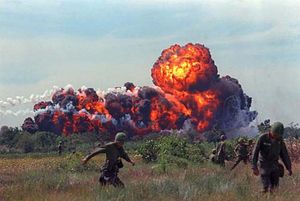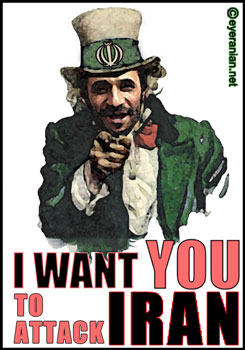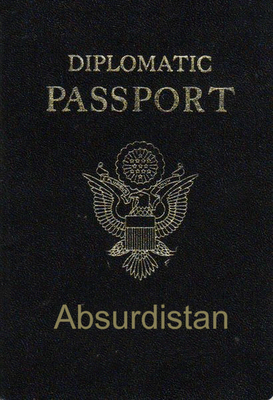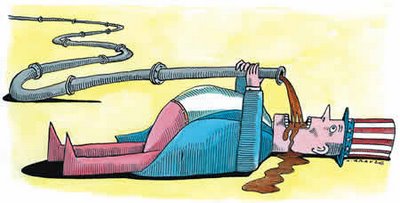Blood And Treasure

Joe Stiglitz, a nobel prize winning economist (he wrote Globalization And Its Discontents- excellent book), revises his estimate of the total cost of the Iraq war as being over $2 Trillion. That's right over $2 Trillion.
Crawling out of the Mainstream Media cave and making sense of the blooming buzzing digital confusion.





In sum, NR [National Review] declared that we were "at war" when we were not, for reasons that it did not specify, against enemies that it could not define, and to achieve goals that war does not advance. "Defining Victory" dresses up as policy but inchoate thirst for vengeance against someone, anyone who hates us. How nations sink, by darling schemes oppressed / when vengeance listens to the fool's request! On Oct. 15, 2001, National Review had no position on post-9/11 foreign policy.
I once heard an NR senior editor, a man revered for his high-mindedness, begin his defense of the Iraq occupation by reminding the audience that on 9/11 "they" attacked "us". In his mind as in others', the invasion of Iraq has so inescapable a connection to 9/11 that only a traitor or fool would deny it.
Never mind the conflation of "Arab radicalism" presumably a reference to Bathism with bin Laden's Muslim jihadism (how would discrediting Saddam's ideology discourage bin Laden's?), the allusion to Hussein rewarding the families of Palestinian suicide bombers (how does terrorism in Israel threaten the United States?), or the assumption that foreign terrorists are driving the insurgency in Iraq (if Iraqis hate the relatively benign Americans, why would they turn over their country to a bunch of foreign wackos?). Let us observe only that the conservative movement's best argument for staying in Iraq is that jihadists "will be perceived" differently, for "it will be clear" that they are harming Muslims at large. In short, if all goes well, the occupation of Iraq might just produce a useful propaganda victory. War as propaganda: surely this is the thinking of clownish dictators rather than mature analysts.
Yet even if fully informed, Muslims may still not perceive Iraq as a "democracy". Scholars can't even agree on the meaning the word. Joseph Schumpeter, the most penetrating modern theorist of democracy, argued in essence that "democracy" is a misnomer, while economist Kenneth Arrow won a Nobel Prize for proving (on one interpretation) that it is literally impossible for a democratic process to satisfy all relevant normative criteria of legitimacy. Meanwhile, the vast majority of people (what George Orwell in 1984 called the "proles", or the 85 percent of the world so uninterested in politics as to have no ideology whatsoever) have not even the most basic grasp of the concepts of democracy or legitimacy. Even if everything in Mesopotamia came up roses, therefore, Muslims may never see the Iraqi government as legitimate. To do so, they would need the minds of angels, not men.
In short, the steps in the causal logic whereby Iraqi democracy defeats anti-American terrorism are so numerous and doubtful that it becomes impossible to believe that Bush's supporters have ever actually thought them through. Those who wonder what error befell the conservative movement since Bush took office are asking the wrong question. Since 9/11, the conservative movement has not made unsound or fallacious arguments for supporting Bush's policies. Rather, it has made no arguments at all.
Some, for example, carry on the Cold War obsession with the so-called "crisis of the West." Convinced that history at some point took a wrong turn, they pore over ancient texts in search of some Hermetic insight into the fatal error. (Not surprisingly, this approach has little popular appeal, although it still commands respect among professional conservatives.) The notion of a crisis of the West, however, grossly overestimates the importance of ideas; indeed, it requires an unphilosophical and almost paranoid ability to treat ideologies (most conspicuously, liberalism) as living, breathing omnipresences to which intentions, tactics, strategies, feelings, disappointments, and conflicts can all be attributed. Believers in the crisis of the West rest almost their entire worldview on an elusive notion "modernity" borrowed from a half-formed science: sociology. Crisis-of-the-West conservatism, at one time a fruitful response to the calamities of the 20th century, has become more a posture than a genuine school of thought.
Another group pleads for the conservative movement to return to its alleged first principles. "If only people would still read Russell Kirk," one hears. But the movement never had any first principles to begin with. Although it boasts a carefully husbanded canon of supposedly foundational texts, the men who wrote them: Kirk, Strauss, Voegelin, Weaver, Chambers, Meyer were notorious eccentrics given to extravagant claims whose policy implications remain largely obscure. Russell Kirk, for example, even as he shrewdly positioned himself as the intellectual godfather of the conservative movement, had almost no political opinions whatsoever.
But "conservatism" has no mystical essence. Rather than a magisterium handed down from apostolic times, it is an ideology whose contours are largely arbitrary and accidental. By ideology, I mean precisely what Orwell depicted in 1984. I do not mean, of course, that conservatism is totalitarian. Taken as prophecy, 1984 has little merit. Taken as a description of the world we actually live in, however, it is indispensable. 1984 reveals not the horrors of the future but the quotidian realities of ideology in mass democracy. Conservatism exemplifies them all....First, like Ingsoc, conservatism has a hierarchical structure. Like Orwell's "Inner Party," those at the top of the movement have almost perfect freedom to decide what opinions count as official conservatism. The Iraq War furnishes a telling example...Second, conservatism is concerned less with truth than with distinguishing insiders from outsiders. Conservatives identify themselves in part by repeating slogans ("we are at war!") that, like "ignorance is strength," are less important for what (if anything) they say than for what saying them says about the speaker...Third, and closely related to doublethinking, the conservative movement engages in selective editing of history. When events have a tendency to disconfirm ideology, down the memory hole they go. Thus, conservatives do not recall their dire warnings about the Soviet Union during the Cold War or about the economy after the Bush I or Clinton tax increases....Fourth, conservatism is entertaining. Understanding the world, though rewarding, provides nothing like the pleasures of a "Two Minute Hate", a focused, ritualized denunciation of enemies.
Whatever its past accomplishments, the conservative movement no longer kindles any "ironic points of light." It has produced fewer outstanding books even as it has taken over more of the intellectual and political landscape. This trend will only continue. Worse, no reckoning will be made: they hope in vain who expect conservatives to take responsibility for the actual consequences of their actions. Conservatives have no use for the ethic of responsibility; they seek only to "see to it that the flame of pure intention is not quelched." The movement remains a fine place to make a career, but for wisdom one must look elsewhere.



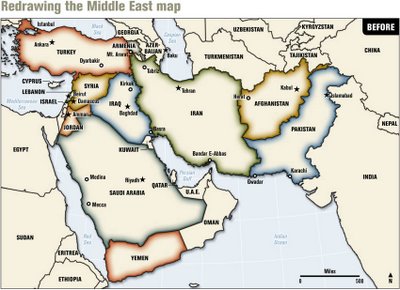
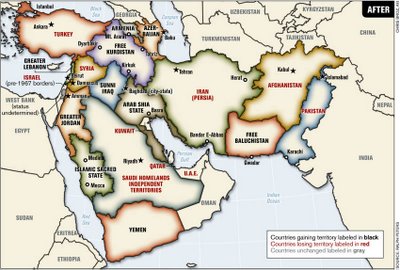









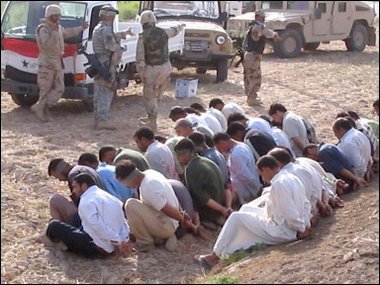
Home after home met the same fate. Some homes had only women; these houses too were ransacked, closets broken, mattresses overturned, clothes thrown out of drawers. Men were dragged on the ground by their legs to be handcuffed outside. One bony ancient sheik walked out with docility and was pushed forcefully to the ground, where he was wrestled by soldiers who had trouble cuffing his arms. A commando grabbed him from them, and tightly squeezed the old man’s arms together, lifting him in the air and throwing him down on the ground, nearly breaking his fragile arms.
The soldier guarding them spoke of the importance of intimidating Iraqis and instilling fear in them. “If they got something to tell us I’d rather they be scared,” he explained.
One sergeant was surprised by the high number of prisoners taken by the troop I was with. “Did they just arrest every man they found?” he asked, wondering if “we just made another 300 people hate us.” The following day 57 prisoners were transported to a larger base for further interrogation. Some were not the suspects, just relatives of the suspects or men suspected of being the suspects.
A lieutenant colonel familiar with the process told me that there is no judicial process for the thousands of detainees. If the military were to try them, there would be a court-martial, which would imply that the U.S. was occupying Iraq, and lawyers working for the administration are still debating whether it is an occupation or liberation. Two years later, 50,000 Iraqis had been imprisoned by the Americans and only 2% had ever been found guilty of anything.
The Procrustean application of spurious information gathered by intelligence officers who cannot speak Arabic and are not familiar with Iraqi, Arab or Muslim culture is creating enemies instead of eliminating them. The S2 captain could barely hide his disdain for Iraqis. “Oh he just hates anything Iraqi,” another captain said of him, adding that the intelligence officers do not venture off the base or interact with Iraqis or develop any relations with the people they are expected to understand. A lieutenant colonel from the Army’s civil affairs command explained that these officers do not read about the soldiers engaging with Iraqis, sharing cigarettes, tea, meals and conversations. They read only the reports of “incidents” and they view Iraqis solely as security threat. The intelligence officers in Iraq do not know Iraq.
One morning in Albu Hishma, a village north of Baghdad cordoned off with barbed wire, the local U.S. commander decided to bulldoze any house that had pro-Saddam graffiti on it, and gave half a dozen families a few minutes to remove whatever they cared about the most before their homes were flattened. In Baquba, two 13-year-old girls were killed by a Bradley armored personnel carrier. They were digging through trash and the American rule was that anybody digging on road sides would be shot.
It is common practice for soldiers to arrest the wives and children of suspects as “material witnesses” when the suspects are not captured in raids. In some cases the soldiers leave notes for the suspects, letting them know their families will be released should they turn themselves in. Soldiers claim this is a very effective tactic. Soldiers on military vehicles routinely shoot at Iraqi cars that approach too fast or come too close, and at Iraqis wandering in fields. “They were up to no good,” they explain. Every commander is a law unto himself. He is advised by a judge advocate general who interprets the rules as he wants. A war crime to one is legitimate practice to another. After the Center for Army Lessons Learned sent a team of personnel to Israel to study that country’s counterinsurgency tactics, the Army implemented the lessons it learned, and initiated house demolitions in Samara and Tikrit, blowing up homes of suspected insurgents.
My friend was rare in that he had somehow overcome the necessary brainwashing soldiers undergo and was able to critically assess his role in Iraq. “In hindsight,” he said, “I have often asked myself what my reaction would be like if I were on the opposite end of this equation. After years of living under a harsh dictatorship, 150,000 soldiers of Sharia show up and offload into Georgetown from boats on the Potomac River after shelling the Capitol. They have a simple mission, they say: transplanting Islamic enlightenment in the decadent land of Kafir. They take over the D.C. Mall and throw a wall around the Smithsonian buildings; they call it the ‘Halal Zone.’ The White House becomes the embassy of Iraq. Some asshole like John Walker Lindh (Ahmed Chalabi), who has lived in the Middle East while the U.S. suffered under dictatorship, is Iraq’s favorite child for taking over the peacock throne of the U.S. My house gets raided and my mother patted down by hygiene-deficient Wahhabis, so I go to Georgetown to force the humiliation off my mind. A group of wirey majahedin show up at Haagen Daaz while I’m enjoying a cone of cookies and cream—a rare moment of bliss in a country going to shit—and grab the owners while taking their ice cream. I return to my home, after walking through one foot of raw sewage water, to turn on the radio and hear the Arab ‘viceroy’ declare in a fatwa that all Christian values should be erased from our governing culture. Meanwhile my dad is laid off from his paycheck for the crime of serving in the U.S. Army to provide for his struggling family.” My friend concluded that “without much doubt in my mind, if I were an Iraqi under the U.S. occupation, I’d be an insurgent.”
